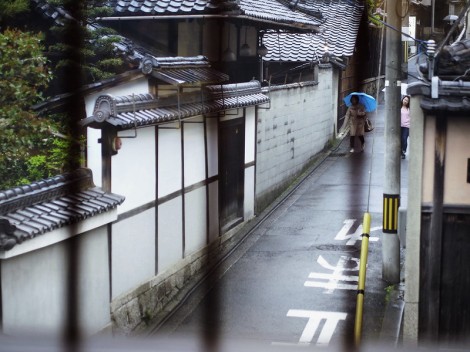
Photo from imnOthere0. The road surface marking says “tomare”. Vehicles are required to come to a full stop before the line.
Several times throughout the night, I wake up to nurse our one month old. But last night was different. Last night, I had to put my hand on my older son’s chest several times to feel his heart beat. I had to give him another kiss.
“It is the outcome we wanted,” reminded my husband, also awake to burp our baby.
And yet I knew that both of us were quietly replaying the images of what had happened that afternoon, except that we were visualizing the outcome of what could have been. There was only an ever so slight difference between the two.
Why do we do that? I asked my husband. Why do we torture ourselves thinking of things that, thank God, didn’t happen?
My son was this close to the tires.
His scooter slid under the car.
He was partially under the car.
What if the driver missed his brakes?
What if he was a tad faster?
What if he didn’t hear us scream?
I winced. No, we should stop thinking like this. It did not happen. My son moved. My son got up and brushed himself off.
My daughter stood petrified a couple of meters away.
The Papa Bear in him unleashed, my husband walked up threateningly close to the driver and yelled. Beneath my husband’s explosive words was this: You could have killed my son.
The driver must have been in shock too, but his reflexive reaction was to smile, the general cultural response in the face of shame or embarrassment, as he apologized. This made my husband angrier. I called out to my husband and hearing my voice seemed to break him out of his rage.
I held my breath as we examined our son closely. I was pretty sure his ribs would be banged up, or a bone somewhere would be broken… he was practically under the car. He pointed to scrapes on his knee and ankles, not much blood, but that was it. He said nothing hurt. We told the driver, who at this time had been speaking to the police on his mobile phone, that there was no need for an ambulance.
As we waited for the police to arrive, we had time to breathe and consider the driver. He was probably in his 60s, wearing a white long sleeved shirt and long black pants, something that he probably wore to work. He looked out onto the road in anticipation of the police. He did not look like he was under the influence. He was… perfectly ordinary. He bent down again to address our son gently with an apology, and our son replied, “Thank you.”
It was then that it struck me. That could have been me. The driver. He could have been me. I suddenly remembered the time I was pulling out from the parking lot onto the main road. The lot was beside the river and much lower than the main road. I looked left, then right, and finding the road clear, advanced from an incline. Suddenly, a young man in a bicycle came speeding down from the left side (he came barreling down after I had looked left). He managed to swerve out of the car’s way and onto the road at the last moment. My heart raced. I almost ran him over. Fortunately there was no oncoming car from the road or he would have been hit by that by trying to avoid me, which would still have made it my fault.
My husband, too, recalled how a few weeks back, he knocked a pedestrian down as he turned a corner with his bicycle. The pedestrian was right at my husband’s blind spot. The damage was limited to the man’s umbrella and nothing else.
We have had our near misses and got lucky.
The police arrived. My husband described what happened. The driver admitted that he looked only to one side, and because his car was high, he failed to see our son on the scooter right in front of him. After the police took all the information they needed and confirmed that we, indeed, were okay to officially declare that there was no injury and that we could not, in the future, go back to this incident to make any claim, they left.
The driver bowed deeply to us to thank us. My husband apologized for yelling and the driver replied that he did not take offense and he understood why my husband was upset. He wanted to offer us money but my husband would not hear of it. It could have been me.
How simple those words and yet how healing they could be.
Might we still have had the same empathy for the driver had our son been more seriously injured or worse? I would like to believe that once the intensity of our grief has passed and we have accepted what has happened, forgiveness would be the only path forward.